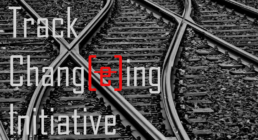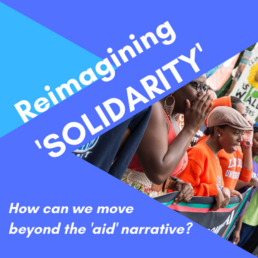Reimagining Solidarity: How can we move beyond the “aid” narrative? Series of webinars and online survey, October to November 2021, and online visioning session in December 2022
Online session on 31 January 2022
What is our vision of global solidarity?
It is no longer debatable that the struggle for global justice and poverty eradication requires a fundamental reimagining – one built on universal values of equality and justice, not aid and charity – and one that’s fit for the 21st century.
Structures that sustain and reproduce inequality must be dismantled and replaced with a more balanced system that redistributes resources equally, compensates for damages and puts in place decolonising mechanisms that can address power inequalities and guarantee equal power relations between minority and majority Worlds (i.e., so called global north and global south). However, it’s our belief at Kampala Initiative that, for new systems, structures, and strategies to come about, a clear vision of the future –which should collectively inspire everyone to engage and commit to working together should come first before everything else.
We are now at a critical stage of creating this new vision, and after an initial session with members of the Kampala Initiative and Medicus Mundi International (MMI) on 14 December, 2022, we have now organized an extended session to include more diverse participants from allied groups (beyond Kampala Initiative and MMI). How does the vision of a more equitable and just future look like to you? What could practical solidarity look like between majority and minority Worlds? For these and more discussions, please sign up for this workshop and let us [collectively] make an honest appraisal of how the world should look if we reimagine it.
- Zoom registration: here.
- Enquiries: Hamimu Masudi, HPA
Reimagining solidarity: Time to rename ‘aid’
Online survey, October to December 2021
With growing consensus on the need to decolonize the language of so called ‘international development’, the “Track Changing Initiative, a working group of the Kampala Initiative, is conducting a consultation on language, and specifically on alternative names for ‘aid’. We hope to find a more appropriate term or terms to describe the financial relationship between the Global North and South which we can adopt.
Language used in the so-called ‘international development’ sector often presents citizens of the Global North as the generous saviours of the Global South. In so doing it masks both historic injustices and current exploitations of power. None more so than the term ‘aid’ which undermines solidarity and distracts us from the real causes of global inequality. With growing consensus on the need to decolonize the language of so called ‘international development’, members of the Kampala Initiative were conducting a consultation on alternative names for the financial resources predominantly transferred from rich countries to poorer ones, commonly known as ‘aid’. We aimed to find a new term or terms to be adopted by our member organisations. The successful term(s) shall reject the current damaging narrative and reflect the need to tackle the root causes of poverty as part of an equitable global movement for change.
Related series of webinars
Nigeria: Time to Rename Aid? – 9 November 2021
Benin: Time to Rename Aid? – 16 November 2021
Uganda: Time to Rename Aid? – 23 November 2021 (new date)
Global: Time to Rename Aid? – 30 November 2021
We sincerely thank all participants for your engagement in the “Time to rename aid” webinar series and online survey that took place between October and December 2021 We could not have achieved much without you!
After the successful conclusion of the webinar series and the survey, we are delighted to share with you preliminary updates on the outcomes.
- Let’s call a spade a spade: reflections on our language consultations
For the updates on outcomes, please go here - Is now the time to rename “aid”?
To read this brilliantly written blog tby Maryam Mohsin, Head of Communications and Media at Bond UK, please go here - The announcement of the new narrative and way forward will be made in January 2022, please watch this space.

Track Changing Initiative: Reclaiming the “aid narrative” and its power for the issue of social justice and global solidarity
The Track Changing Initiative (TCI) is a task group of the Kampala Initiative that was established during a civil society workshop on “How to advance cooperation and solidarity within and beyond aid” that took place in Kampala on 15-16 November 2019. The aim of this task group is to provide a critical and global civil society perspective on the “aid narrative”, and to look for more truthful alternatives grounded in social justice and global solidarity.
The “aid narrative” and the importance of finding an alternative
The current dominant story we are told about poor health and poverty is one of charity, aid and so-called “international development”. This story tells us that poverty and poor health can be overcome by generous donors in the “global north” simply giving to those in the “global south”.
But this narrative is untruthful and damaging – it acts as a smokescreen distracting us from demanding action on the real issues that create and maintain poor health; it undermines global solidarity by creating “otherness” and cementing colonially-rooted power relations in favour of the “global north”; and may also be linked with declining public support for development and global health related issues.
Social psychology and cognitive linguistics have shown us that how we communicate the issues we care about impacts how people think, feel and act on them. In other words, there is power in the language we use.
Studies such as this one really show how changing just one word in a sentence can make a difference to how people would address an issue.
We therefore believe that finding a more truthful way to communicate about poor health and poverty in the world is an important part of a strategy for transforming aid into an equitable means of ensuring health rights, and to build a future where health justice and equity are realised and aid is no longer a necessity.
We also believe that it is important to ensure that initiatives to move away from the traditional “aid narrative” incorporate the perspectives of communities most impacted by this language.
Track Changing Initiative
At a civil society workshop in Kampala, a group of civil society representatives came together to discuss, address and find alternatives to the “aid narrative”. We agreed that the aid narrative” deserved continued attention from activists around the world, bringing a global perspective on this issue, and so formed the Track Changing Initiative.
The aim of this task group is to provide, and engage others, in a critical global civil society perspective on the “aid narrative”, and to collectively look for more truthful alternatives grounded in social justice and global solidarity.
We aim to do this through the implementation of our work plan, which contributes to and compliments work Health Poverty Action is already carrying out in this area.
Core team
- Akaninyene Obot, Nnamdi Azikiwe University & Ukana West 2 Community Based Health Initiative, Nigeria
- Baijayanta Mukhopadhyay, People’s Health Movement, Canada
- Danny Gotto, Innovations for Development, Kenya
- Linda Shuro, People’s Health Movement, South Africa
- Lizzy Igbine, Nigerian Women Agro Allied Farmers Association
- Spéro Hector Ackey, People’s Health Movement, Benin (co-ordinator)
- Hamimu Masoudi, Health Poverty Action, UK (co-ordinator)
Documents
- Track Changaing Initiative TOR
- TCI Work Plan_V2 Dec 2020
- See also: previous webinars hosted by the Track Changing Initiative (Kampala Initiative Webinars 4 and 5)

The Track Changing Initiative (TCI) is a task group of the Kampala Initiative. We invite interested civil society to consider joining our group: If you have endorsed the Kampala Declaration and are able to contribute actively to this group’s work, please send an expression of interest to Hamimu Masudi h.masudi@healthpovertyaction.org with the following information:
- Your name, country of residence/work and institutional affiliation
- Your background interest in the TCI work plan
- A statement on what you could contribute to our planned activities
Please note that we aim to ensure that there is equal regional representation within this group.
